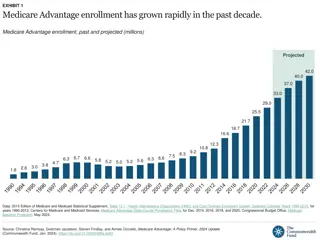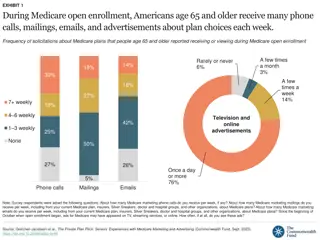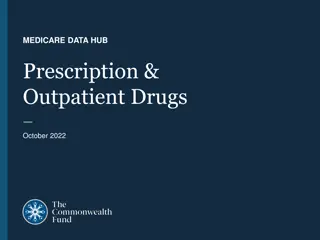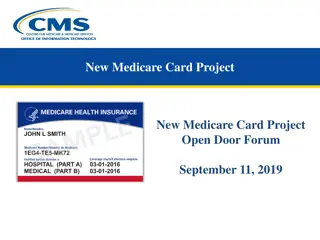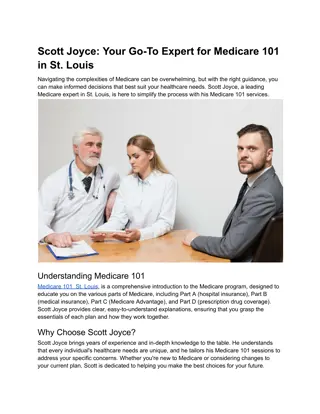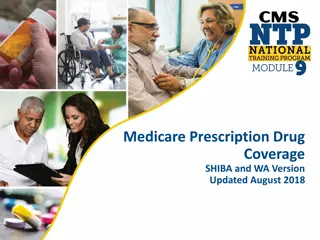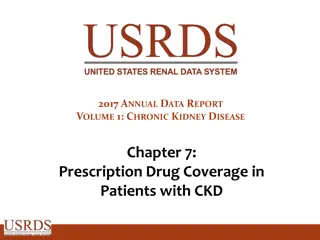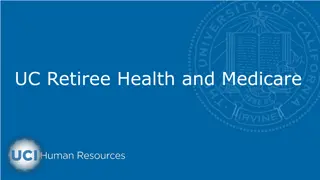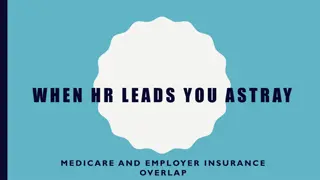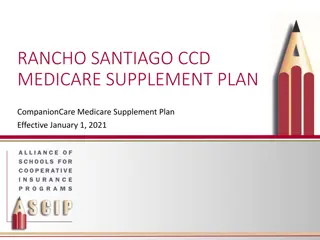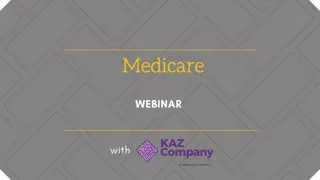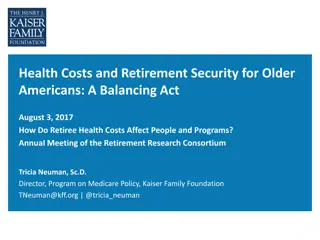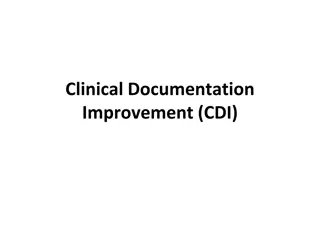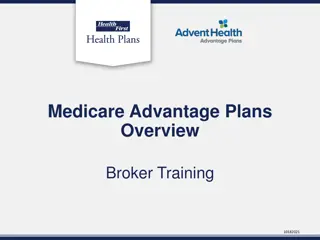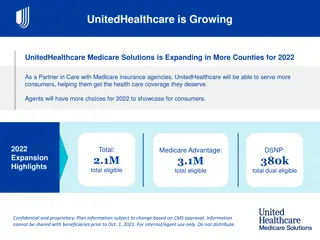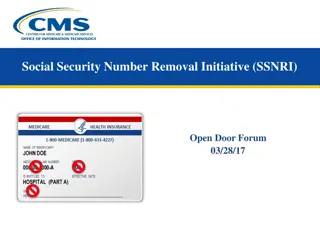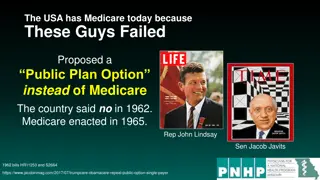Understanding Medicare: Coverage Options and Enrollment Details
Medicare is a federal health insurance program catering to individuals aged 65 and older, those with certain disabilities, end-stage renal disease, or ALS. It offers different coverage options including Part C Medicare Advantage Plans. Enrollment details, premiums, and benefits such as hospital insurance, outpatient services, prescription drugs, and more are highlighted. Learn when and how to enroll in Medicare to access the best healthcare options available.
Uploaded on Nov 21, 2024 | 0 Views
Download Presentation

Please find below an Image/Link to download the presentation.
The content on the website is provided AS IS for your information and personal use only. It may not be sold, licensed, or shared on other websites without obtaining consent from the author. Download presentation by click this link. If you encounter any issues during the download, it is possible that the publisher has removed the file from their server.
E N D
Presentation Transcript
Medicare is the federal health insurance program for people who are 65 or older, certain younger people with disabilities, individuals with End-Stage Renal Disease (permanent kidney failure requiring a transplant or dialysis, sometimes called ESRD), and those with Lou Gehrig s (ALS) disease. Different coverage options are available
+ Part C Medicare Advantage Plans (HMOs and PPOs) This includes Part A, Part B & usually Part D Part A Hospital Insurance Part B Outpatient Services Part D Medicare Prescription Drug Medigap/ Medicare Supplement Enroll when you enroll in Part B Premiums, deductibles and co-pays vary by plan Second payer to Medicare Private Insurance Enroll at age 65 or 25th month of disability OR delay until retired or use Union or VA coverage Premiums income based $185 deductible $0 Home Health 20% co-pays on most services Medicare Savings Program Enroll at age 65 or 25th month of disability Enroll when you enroll in Part B Premiums, deductibles and co-pays vary by plan Be a smart shopper and compare every Oct. 15-Dec. 7 $0 premium Hospital deductible SNF $0 until days 21-100 20% co-pay $0 Home Health (100 visits) $0 Hospice Able to enroll whenever eligible for Part A & B Can change to Original Medicare or to another Part C Oct. 15-Dec.7 Extra Help & MSP Extra Help
Part A Hospital Insurance Part B Outpatient Services Part D Medicare Prescription Drug Enroll at age 65 or 25th month of disability OR delay until retired or use Union or VA coverage Premiums income based $185 deductible $0 Home Health 20% co-pays on most services Medicare Savings Program Enroll at age 65 or 25th month of disability Enroll when you enroll in Part B Premiums, deductibles and co-pays vary by plan Be a smart shopper and compare every Oct. 15-Dec. 7 $0 premium Hospital deductible SNF $0 until days 21-100 20% co-pay $0 Home Health (100 visits) $0 Hospice Extra Help
Health care option by the federal government Provides your Part A, B and D See any doctor/hospital that accepts Medicare, coverage is nationwide You pay: Part B & D premiums (Part A usually premium free) Deductibles, coinsurance, or copayments Get Medicare Summary Notice
Enroll around your 65th birthday, 25th month of disability benefits (even if not retiring) Enrollment period is 3 months before birthday month, birthday month and 3 months after birthday Usually No Premium (if paid FICA tax for 10 years; can buy- in; TRS is different) Deductibles and co-pays based on benefits period Must be Admitted and stay in a hospital for 2-midnights* for costs to go to Part A and 3 midnights for Part A to cover SNF
Medicare Part ACovered Services Semi-private room, meals, general nursing, and other hospital services and supplies. Includes care in critical access hospitals and inpatient rehabilitation facilities. Inpatient mental health care in psychiatric hospital (lifetime 190-day limit). Generally covers all drugs provided during an inpatient stay received as part of your treatment. Inpatient Hospital Stays Semi-private room, meals, skilled nursing and rehabilitation services, and other services and supplies. 100 days after a hospital stay Skilled Nursing Facility Care Part-time or intermittent skilled nursing care, and/or physical therapy, speech-language pathology services, and/or services for people with a continuing need for occupational therapy, some home health aide services, medical social services, and medical supplies for use at home. 100 visits Home Health Services For terminally ill and includes drugs for pain relief and symptom management, medical care, and support services from a Medicare-approved hospice. Hospice Care If not donated by blood bank or replaced by family/friend donation, you pay fir 3 units per yr (rare). Blood
Begins Day 1 inpatient (admitted, 2 midnights) Ends 60 days after no inpatient hospital or SNF Pay Part A deductible for each benefit period $1,364 in 2019 No limit to number of benefit periods you can have
For Each Benefit Period in 2019 Days 1-60 Days 61-90 You Pay $1,364 deductible $341 per day $682 per day Days 91-150 (up to 60 lifetime reserve days) Beyond Lifetime Reserve Days All Costs
For Each Benefit Period in 2019 You Pay Days 1-20 $0 Days 21-100 (20%) $170.50 per day All days after 100 All Costs
You must be under the care of a doctor, and you must be getting services under a plan of care established and reviewed regularly by a doctor. Face-to-face encounter prior to services You must need, and a doctor must certify that you need skilled therapist or skilled nursing on part- time or intermittent basis. The home health agency caring for you must be Medicare-certified. You must be homebound, and a doctor must certify that you're homebound.
Enroll : on your 65th birthday or 25th month of disability Or > 65y.o. and after 8 months of no longer covered by employers or union insurance Penalty for late enrollment -*10% premium penalty if later for life If covered by employer/union insurance or VA outpatient benefits and you wish to opt-out of Part B until retired/no longer covered, you can 1)make an appointment with SSA or 2)when you get your Medicare Card, sign & return it Back
What Are Medicare Part BCovered Services? Doctors Services outpatient and some doctor services you get when you re a hospital inpatient) or covered preventive services. You pay 20%of the Medicare-approved amount (if the doctor accepts assignment) and the Part B deductible applies. Services that are medically-necessary (includes Outpatient Medical and Surgical Services and Supplies For approved procedures, like X-rays, casts, or stitches. You pay the doctor 20% of the Medicare-approved amount for the doctor s services and hospital co-pay if the doctor accepts assignment. The Part B deductible applies.
What Are Medicare Part B Covered Services (continued) Durable Medical Equipment home. Some items must be rented. Medicare is phasing in a program called competitive bidding, which means that in some areas, if you need certain items, you must use specific suppliers, or Medicare won t pay for the item and you ll likely pay full price. Visit medicare.gov/supplier to find Medicare- approved suppliers in your area. You pay 20%of the Medicare-approved amount, and the Part B deductible applies. Items such as oxygen equipment and supplies, wheelchairs, walkers, and hospital beds for use in the
More Medicare Part BCovered Services Home Health Services skilled nursing care, and/or physical, speech, and/or occupational therapy(s), some home health aide services, medical social services, and medical supplies. You pay nothing for covered services. Medically-necessary part-time or intermittent Other Services (including but not limited to) Medically-necessary medical services and supplies, such as clinical laboratory services, diabetes supplies, kidney dialysis services and supplies, mental health care, limited outpatient prescription drugs, diagnostic X-rays, MRIs, CT scans, and EKGs, transplants and other services. Costs vary.
Welcome to Medicare preventive visit Annual Wellness visit Abdominal aortic aneurysm screening Alcohol misuse screening and counseling Behavioral therapy for cardiovascular disease Bone mass measurement Cardiovascular disease screenings Colorectal cancer screenings Depression screening Diabetes screenings Diabetes self-management training Flu shots Glaucoma tests Hepatitis B shots HIV screening Mammograms (screening) Obesity screening and counseling Pap test, pelvic exam, and clinical breast exam Pneumococcal pneumonia shot Prostate cancer screening Sexually transmitted infection (STIs) screening and high-intensity behavioral counseling to prevent STIs Smoking cessation Advanced Directives counseling (free during annual wellness, 20% co-pay any other time) Some Preventives are low-cost/no cost unless positive, then billed as diagnostic
2019 Monthly Premium Premiums If Your Yearly Income in 2017* was File Joint Tax Return Married, File Separate Tax Return N/A File Individual Tax Return Apply for Medicare Savings Program If $15,966 or less If $21,480 or less $85,000 or less $170,000 or less $85,000 or less N/A $135.50 $189.60 $270.90 $352.20 $433.40 $85,000.01-$107,000 $170,000 -$214,000 $107,000.01-$133,500 $214,000 -$267,000 N/A $133,500.01-$160,000 $267,000 -$320,000 $85,001-$129,000 Above $129,000 Above $160,000 Above $320,000 Premiums usually deducted from Social Security check ($10/mos charge if not deducted from SSA check in 2018) Annual Deductible - $185/yr 2019 Co-Pay 20% of service/equipment * For what you pay in 2019
Based on the following situations, Social Security may reconsider a higher premium amount, but they will need documentation verifying the event and reduction in income: You married, divorced, or became widowed; You or your spouse stopped working or reduced your work hours; You or your spouse lost income producing property because of a disaster or other event beyond your control; You or your spouse experienced a scheduled cessation, termination, or reorganization of an employer s pension plan You or your spouse received a settlement from an employer or former employer because of the employer s closure, bankruptcy, or reorganization
What is Part D? Prescription drug plans approved by Medicare Run by private companies Available to everyone with Medicare Must be enrolled in a plan to get coverage Premiums, Deductibles and Co-pays vary by plan and by prescription
When You Can Join or Switch Medicare Prescription Drug Plans Same as Part B if enrolling at 65/disability 2 months after not covered by employer Initial Enrollment Period Medicare s Open Enrollment Period October 15 December 7 each year Coverage begins January 1 Medicare Advantage Open Enrollment Period If enrolled in a Medicare Advantage plan at the start of the year, you have until March 31st to disenroll and sign-up for a Part D prescription drug plan or another Medicare Advantage Plan (new in 2019).
When You Can Join or Switch Drug Plans You permanently move out of your plan s service area You lose other creditable prescription coverage You weren t adequately told that your other coverage wasn t creditable or your other coverage was reduced and is no longer creditable You enter, live at, or leave a long-term care facility You qualify for Extra Help (once a calendar quarter) You join or switch to a plan that has a 5-Star rating You belong to a State Pharmaceutical Assistance Program (only available in TX for HIV and ESRD) Other exceptional circumstances Special Enrollment Periods (SEPs) Penalty for late enrollment in Part D - is calculated by multiplying the 1% penalty rate by the national base beneficiary premium ($33.19 in 2019) by the number of full months you were eligible to join a Medicare drug plan but didn t. The penalty calculation isn t based on the premium of your plan.
Best to compare every year by your individual list of prescriptions using www.medicare.gov PlanFinder or calling an Area Agency on Aging (Medicare SHIP)
2019 Monthly Premium Premiums If Your Yearly Income in 2017* was File Joint Tax Return Married, File Separate Tax Return $85,000 or less File Individual Tax Return Your plan premium only +$12.40 +$31.90 +$51.40 +$70.90 $85,000 or less $170,000 or less $85,000.01-$107,000 $170,000 -$214,000 N/A $107,000.01-$133,500 $214,000 -$267,000 N/A $133,500.01-$160,000 $267,000 -$320,000 $85,001-$129,000 Above $129,000 Above $160,000 Above $320,000 Applies to both Part D and Part C plans with drug coverage; Has the same appeal process as Part B premium s income related monthly adjustment
First Health Part D Value Plus AARP MedicareRX Enhanced
Coverage Period Deductible What you pay Full negotiated price until you reach your plan s deductible. Deductibles vary by plan, and not every plan has a deductible. A plan s deductible can be no higher than $415 in 2019. For many plans, the deductible does not apply for tier 1 and tier 2 drugs. After meeting a deductible, you pay a certain copayment or coinsurance, based on the tier of the drug on the plan s formulary. After total drug costs reach a certain amount ($3,820 for most plans), you pay 25% of the cost of brand-name drugs, or 37% of the costs for generics. Once you have spent $5,100 out-of-pocket on drugs, your costs go down to 5%, or $3.40 for generics and $8.50 for brand- name drugs, whichever is greater. Initial Coverage Period Donut Hole/Coverage Gap Catastrophic Coverage
Optional coverage Cannot have a Part C Plan (Only for Original Medicare) Private Insurance Companies Loosely regulated by Medicare & State Dept of Insurance Covers out-of-pocket costs associated with Original Medicare Prices vary Medigap Plans cannot deny you, if you apply when enrolling in Part B (or only 63 days after involuntarily losing most other health coverage for Plans A, B, C, F, K) *F and C not allowing new enrollees in 2020 May not need if you have retiree health benefits plan (consult HR)
Medicare Supplement Insurance (Medigap) Plans A B C D F* 100% 100% 100% 100% 100% 100% 100% G K** L** 100% M N*** 100% Benefits 100% Medicare Part A coinsurance and hospital costs (up to an additional 365 days after Medicare benefits are used) Medicare Part B coinsurance or copayment Blood (first 3 pints) Part A hospice care coinsurance or copayment Skilled nursing facility care coinsurance Medicare Part A deductible Medicare Part B deductible Medicare Part B excess charges Foreign travel emergency (up to plan limits) * Plan F also offers a high-deductible plan in some states. If you choose this option, this means you must pay for Medicare-covered costs (coinsurance, copayments, deductibles) up to the deductible amount of $2,300 in 2019 before your policy pays anything. **For Plans K and L, after you meet your out-of-pocket yearly limit and your yearly Part B deductible ($185 in 2019), the Medigap plan pays 100% of covered services for the rest of the calendar year. *** Plan N pays 100% of the Part B coinsurance, except for a copayment of up to $20 for some office visits and up to a $50 copayment for emergency room visits that don t result in an inpatient admission. 100% 100% 100% 100% 100% 100% 100% 100% 50% 75% *** 50% 75% 100% 100% 100% 100% 100% 100% 100% 100% 100% 100% 100% 100% 100% 100% 100% 100% 50% 75% 100% 100% 100% 100% 100% 100% 100% 100% 100% 100% 100% 50% 100% 100% 50% 50% 75% 75% 100% 100% 100% 100% 100% 100% 100% 100% 100% Out-of-pocket limit in 2018 $4,960 $2,480
Part C Medicare Advantage Plans (like HMOs and PPOs) This includes Part A, Part B & usually Part D
MCO plans approved by Medicare Run by private companies Bundles Parts A, B and D into an HMO or PPO managed healthcare plan. May include extra benefits Like vision or dental or medical transportation Benefits and cost-sharing may be different
Must still pay Part B premium Some plans may pay all or part for you You may also pay monthly premium to plan You pay deductibles/coinsurance/copayments Different from Original Medicare Varies from plan to plan Costs may be higher if out of network Often requires pre-authorization of services Need to check if accepted by preferred physicians, hospitals, therapists and pharmacies
Must be eligible for Part A & B Cannot be enrolled in an Employer s Health Plan or have End Stage Renal Disease Open Enrollment: Oct. 15 Dec. 7 Medicare Advantage Open Enrollment Period- If you are enrolled in a Medicare Advantage plan, you can change to another Medicare Advantage plan, or choose to switch to Original Medicare with Part D coverage: January 1- March 31 *New in 2019! Trial Right 1 year to switch to Original Medicare (and sign-up for Medigap) if enroll in a Part C Plan when first eligible for Medicare Part A at age 65. Can dis-enroll if move out of plan s service area, admitted to a SNF, or upgrade to a 5 star Advantage Plan
Call all of your following: primary physician (__accepts plan ___does Not accept) specialist physicians (__accepts plan __does Not accept) hospital (__accepts plan ___does Not accept) pharmacy (__accepts plan __does Not accept) Since an insurance company can have more than 1 Advantage Plan be sure to specify which one
Medicare Extra Help (LIS) for those with monthly income less than $1,581/individual or $2,134/couple* Resource limits: Bank accounts, stocks, bonds, and other investments cannot value more than $14,390 for an individual ($28,720 for a married couple), NOT including your home and car. Saves the average person $4,000/year *Income can be higher if receiving earned income from working or caring for a dependent in the home (must appeal with Texas Legal Service Ctr in TX for household size)
Qualified Medicare Beneficiary (QMB) Income limit: $1,061 monthly ($1,430 for a married couple); Pays for Part A premiums, Part B premiums, Part A&B deductibles, coinsurance, and copays. SLMB & QI Income limit: $1,426 monthly ($1,923 for a married couple); Pays for Medicare Part B premium Resource limits: Bank accounts, stocks, bonds, and other investments cannot value more than $7,730 for an individual ($11,600 for a married couple). NOT including your home/car *Income may be higher if you are supporting other family members in your home or if you have income from still working
For individuals newly eligible for Medicare: 7 month initial enrollment period. 3 months before 65th birthday 65th birthday month 3 months after 65th birthday Enrollment Process: Those receiving Social Security benefits will be automatically enrolled in Medicare. Social Security will mail out their card; Those not receiving Social Security benefits need to contact Social Security to enroll (you do not need to sign up for retirement benefits to get Medicare); During 7 month initial enrollment period you can sign up for a Part D prescription drug plan or Part C advantage plan. Delaying Enrollment You can delay enrollment in Medicare if you have credible coverage (more on this later) ESRD and ALS Enrollment process is different if an individual under 65 is eligible due to a diagnosis of ESRD or ALS.
Sign-up Date Coverage Begins During the 3 months before your 65th birthday During your birthday month The 1st day of your birthday month The 1st day of the month after your birthday 3 months after your birthday month During the month after your birthday month During the 2nd month after your birthday month During the 3rd month after your birthday month 5 months after your birthday month 6 months after your birthday month
Someone can incur a late enrollment penalty if they do not enroll in Medicare Part A/B and prescription drug coverage when they are first eligible (if they do not have credible coverage); Part B late enrollment penalty: 10% additional premium for each full 12-month period that you could have had coverage but did not sign up for it; Part D late enrollment penalty: 1% of the national base rate premium ($33.19 in 2019) times the number of full, uncovered months that you didn t have Part D or credible coverage
If you miss your initial enrollment period, and have no credible coverage, you must wait until the General Enrollment Period to sign-up for Medicare Part A and/or Part B. January 1st- March 31st, with coverage not starting until July 1st.
When Medicare beneficiaries can enroll in or change their Medicare Part D prescription drug coverage or Part C Medicare Advantage Plan October 15th- December 7th, with coverage starting January 1st.
January 1st- March 31st, If enrolled in a Medicare Advantage plan, you can switch to another Medicare Advantage plan, or switch to Original Medicare with a Part D Coverage will start the 1st of the month after you make the change.
If you delayed enrollment into Medicare due to employer s health plan Part B -Up to 8-months after not covered by employer s plan (COBRA does not count as coverage exempting from Part B) Part D - up to 2 months after not covered by employer s plan (different from Part B, COBRA can count as coverage allowing longer delay in enrolling in Part D) Medigap plan up to 63 days after involuntarily losing coverage that supplements Medicare (including employer plan, Medicare Advantage plan, retiree coverage, or COBRA coverage)
Different rules for eligibility, enrollment periods, and coordination of benefits apply for those eligible for Medicare because of ESRD; Those with ESRD can contact SSA to enroll. Medicare will start on the 1st day of the 4th month of dialysis treatment, or the 1st month of dialysis treatment if done at home. Medicare also covers kidney transplants; If the person has coverage through an employer group health plan, there is a 30-month coordination of benefits period where the group health plan will pay primary, Medicare will pay primary after this. There is no Special Enrollment Period for Part B coverage after credible coverage ends. They will have to wait for the General Enrollment Period. For this reason, it is suggested someone enroll in both Parts A and Parts B or not enroll at all; Currently, someone who is eligible for Medicare due to ESRD cannot enroll in a Part C Medicare Advantage Plan.
Retire from Job, Enroll in Medicare Retiring Medicare Only Enroll in Medicare Parts A & B online or at SSA Office, Enroll in Part D or C with help from AAA Depending on retiree health benefits or VA, consider enrolling in Medicare Medigap Plan Continue Working Working Medicare Only Decline Employer s Group Health Plan and Enroll in Medicare A, B & D Depending on retiree health benefits or VA, consider enrolling in Medicare Medigap Plan Employers with <20 employees do not have to offer employer group health plan (ERISA) Continue Work, Delay Medicare Parts B & D Enroll in Medicare Part A Decline Medicare Part B on Medicare Card (if taking Social Security benefits) or Call SSA and schedule a phone or office interview to show you have employer coverage. When you retire, get a letter from employer s plan stating you had creditable coverage. Working Employer s Plan Only Continue Work, Enroll in Both your Employer s Plan & Medicare Working Medicare & Employer s Plan Ask your employer s plan if it allows for you to be enrolled in both, esp. Part D (C is NOT an option) You will have to pay premiums of both Medicare Parts B& D and your employer s plan Your employer s plan will determine which doctors /providers are covered (in-network) Consider enrolling in Medigap plan before 63 days after retired
section 1851(c)(3)(A)(ii) of the Social Security Act: to provide seamless enrollment in an MA plan for newly Medicare Advantage eligible individuals who are currently enrolled in other health plans offered by the MA organization (such as commercial or Medicaid plans) at the time of their conversion to Medicare. Only requires a 90-day mailed notice before person is eligible for Medicare Beneficiary must ACTIVELY decline this automatic enrollment in a Medicare Advantage Plan (enrolling in Part B and another Part D will not stop the conversion) Can file for appeal to retroactively disenrolled from Part C plan with CMS
Health Savings Accounts are savings accounts that allow employees who are in a high deductible plan to pay for medical expenses with pre-tax dollars. People with Medicare Part A or B can NOT contribute money to HSAs. If a person enrolls in Medicare part way through a year and still has money in their HSA, they can still use that money. The final year s contribution is pro-rata (#months before enrolled in Medicare/HSA yearly limit=allowed contribution) A person choosing to stay with their employer s high-deductible plan, can delay enrolling in Medicare Part A and enroll during their same special enrollment period as Part B (upon retirement/not working) *IRS pub. 969 Flexible Spending Accounts are spending accounts that allow employees to pay for medical expenses with pre-tax dollars. People with Medicare Part A or B can contribute money to FSAs.
If You? Situation Pays 1st Pays 2nd Are 65 or older and covered by a group health plan because you or your spouse is still working The employer has 20 or more employees Group Health Plan Medicare The employer has less than 20 employees * Medicare Group Health Plan Have a disabled dependent under age 65 enrolled in Medicare and covered by your work s group plan (i.e. spouse) The employer has 100 or more employees Group Health Plan Medicare The employer has 100 or less than employees Medicare Group Health Plan Retired and qualified for retiree health insurance Enrolled in Medicare and retiree health insurance Medicare Retiree Health Insurance *For multi-employer plans, the largest employer within the multi-group plan determines the size of the plan for all enrollees. *To qualify as a Group Health Plan, the plan must be available to at least 2 employees. *Employers with less than 20 employees do not have to offer Group Health Plan to persons eligible for Medicare (ERISA) *SHOP Plans are treated the same as any employer Group Health Plan (can have SHOP and Medicare)
If You? Situation Pays 1st Pays 2nd Have End-Stage Renal Disease (ESRD) and group health plan coverage (including a retirement plan) or COBRA First 30 months of eligibility or enrolled in Medicare Group Health Plan/COBRA Medicare After 30 months of eligibility or enrolled in Medicare Medicare Group Health Plan/COBRA Are 65 or over OR disabled (other than by ESRD) and covered by Medicare and COBRA coverage Enrolled in Medicare and covered by COBRA. If you have Medicare first, you can qualify for COBRA. If you have COBRA first, it will likely be cancelled when you re eligible for Medicare. Medicare COBRA Enrolled in Medicare and are covered under worker s compensation because of job related illness/accident Enrolled in Medicare and covered by worker s compensation Workers compensation only for services or items related to workers compensation claim Usually doesn t apply. However, Medicare may make a conditional payment that must be repaid to Medicare when a settlement or other payment is made. Medicare Compassionate Care Allowances do not require the 24 months: : https://www.ssa.gov/compassionateallowances/conditions.htm



